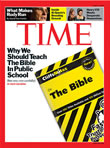I’ve been tagged for one o’ them crazy memes. This one involves:
- Grabbing the nearest book.
- Turning to page 123.
- Quoting the fifth sentence on the page.
I’m sitting in the front room near a bookshelf full of books. Strictly speaking, there are four books that are nearly equidistant from me, so I’m going to quote the requested passage from all four of them.
From Matthew Henry’s Commentary on the Whole Bible:
Thus the correspondence was to be first settled by a sensible appearance of the divine glory, which was afterwards to be carried on more silently by the ministry of Moses.
From the Reformed Expository Commentary on Galatians by Philip Graham Ryken:
Even though he did not use these precise words, Paul obviously believed that the Bible is infallible and inerrant from beginning to end.
From Wayne Grudem’s Systematic Theology:
Because there is some common knowledge of right and wrong, Christians can often find much consensus with non-Christians in matters of civil law, community standards, basic ethics for business and professional activity, and acceptable patterns of conduct in ordinary life.
And the wildcard in the bunch, from Richard Lyman Bushman’s Rough Stone Rolling:
The revelation on the millennial gathering brought all the routine activities of everyday life into question.


